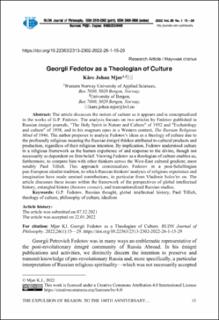| dc.contributor.author | Mjør, Kåre Johan | |
| dc.date.accessioned | 2022-04-06T10:17:19Z | |
| dc.date.available | 2022-04-06T10:17:19Z | |
| dc.date.created | 2022-03-30T11:27:14Z | |
| dc.date.issued | 2022 | |
| dc.identifier.citation | Mjør, K. J. (2022). Georgii Fedotov as a Theologian of Culture. RUDN Journal of Philosophy, 26(1), 15–29. | en_US |
| dc.identifier.issn | 2313-2302 | |
| dc.identifier.uri | https://hdl.handle.net/11250/2990141 | |
| dc.description.abstract | The article discusses the notion of culture as it appears and is conceptualized in the works of G.P. Fedotov. The analysis focuses on two articles by Fedotov published in Russian émigré journals, "The Holy Spirit in Nature and Culture" of 1932 and "Eschatology and culture" of 1938, and in his magnum opus in a Western context, The Russian Religious Mind of 1946. The author proposes to analyze Fedotov's ideas as a theology of culture due to the profoundly religious meaning the Russian émigré thinker attributed to cultural products and production, regardless of their religious intention. By implication, Fedotov understood culture in a religious framework as the human experience of and response to the divine, though not necessarily as dependent on firm belief. Viewing Fedotov as a theologian of culture enables us, furthermore, to compare him with other thinkers across the West-East cultural gradient, most notably Paul Tillich. This approach contextualizes Fedotov in a post-Schellingian pan-European idealist tradition, to which Russian thinkers' analyses of religious experience and imagination have made seminal contributions, in particular from Vladimir Solov'ev on. The article discusses these issues within the framework of the perspectives of global intellectual history, entangled history ( histoire croisée ), and transnationalized Russian studies. | en_US |
| dc.description.abstract | В статье рассматривается понятие культуры в работах Георгия Петровича Федотова. Анализ сосредоточен на двух статьях Федотова, опубликованных в русских эмигрантских журналах, - «Святой дух в природе и культуре» (1932) и «Эсхатология и культура» (1938), а также в его magnum opus «Русская религиозная мысль» (1946). Автор статьи предлагает рассматривать идеи Федотова как теологию культуры, поскольку сам ученый приписывал религиозный смысл культурным продуктам и их производству. Таким образом, Федотов понимал культуру в религиозной структуре как человеческие переживание и реакцию на божественное, хотя и не обязательно находящиеся в зависимости от твердой веры. Восприятие Федотова как теолога культуры позволяет сравнить его с другими мыслителями на культурном градиенте Запад-Восток, например, с Паулем Тиллихом, и вписать его в контекст пост-шеллингианской общеевропейской идеалистической традиции, в которую анализ религиозного опыта и воображения русских мыслителей (начиная с Вл. Соловьева и далее) внес существенный вклад. Автор статьи обсуждает поднятые вопросы с точки зрения глобальной интеллектуальной истории, histoire croisée, и транснационализированных российских исследований. | en_US |
| dc.language.iso | eng | en_US |
| dc.publisher | Rossijskij universitet družby narodov | en_US |
| dc.rights | Navngivelse 4.0 Internasjonal | * |
| dc.rights.uri | http://creativecommons.org/licenses/by/4.0/deed.no | * |
| dc.title | Georgii Fedotov as a Theologian of Culture | en_US |
| dc.type | Peer reviewed | en_US |
| dc.type | Journal article | en_US |
| dc.description.version | publishedVersion | en_US |
| dc.rights.holder | © Mjør K.J., 2022 | en_US |
| dc.source.pagenumber | 15-29 | en_US |
| dc.source.volume | 26 | en_US |
| dc.source.journal | Вестник Российского университета дружбы народов. Серия: Философия | en_US |
| dc.source.issue | 1 | en_US |
| dc.identifier.doi | 10.22363/2313-2302-2022-26-1-15-29 | |
| dc.identifier.cristin | 2013639 | |
| cristin.ispublished | true | |
| cristin.fulltext | original | |
| cristin.qualitycode | 1 | |

